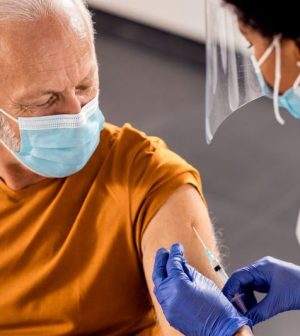- Could Your Grocery Store Meat Be Causing Recurring UTIs?
- Are You Making This Expensive Thermostat Error This Winter?
- Recognizing the Signs of Hypothyroidism
- 10 Strategies to Overcome Insomnia
- Could Artificial Sweeteners Be Aging the Brain Faster?
- Techniques for Soothing Your Nervous System
- Does the Water in Your House Smell Funny? Here’s Why
- Can a Daily Dose of Apple Cider Vinegar Actually Aid Weight Loss?
- 6 Health Beverages That Can Actually Spike Your Blood Sugar
- Treatment Options for Social Anxiety Disorder
COVID Vaccine Won’t Raise Stroke Risk

COVID-19 vaccines do not increase your risk for stroke, new research shows, but severe COVID infection does, and experts hope the finding will ease the concerns of those who are hesitant to get the shot.
“We now know that patients who’ve had a vaccine are not at higher risk of stroke, thanks to a large body of data with millions of patients who have been included,” said Dr. Alexis Simpkins, director of vascular research at Cedars-Sinai Medical Center in Los Angeles. “You’re 200 times less likely — if you compare the numbers — to have had a stroke if you were vaccinated, than a person who was hospitalized with severe COVID-19 and was not vaccinated.”
This is because COVID infection, particularly severe infection, can cause inflammation, clot formation and heart disease, all of which increase the risk of stroke, according to Simpkins. She’s a co-author of an editorial published Aug. 24 along with new research in the journal Neurology.
“Clots can form and block blood flow to the brain. The lack of blood flow causes the brain cells to die, resulting in an ischemic stroke,” she said in a Cedars-Sinai news release. “Also, COVID-19-related inflammation can damage blood vessels in the brain, disrupting blood vessel integrity and resulting in brain hemorrhage.”
Simpkins noted that stroke risk is especially high for those at risk of severe COVID infection. Those folks include people with lung or heart disease, high blood pressure, high cholesterol, diabetes, a prior stroke and people who are immunocompromised. People aged 65 and older are also at higher risk of stroke.
Even if you don’t have COVID-19, the pandemic has created conditions that can increase your risk of having a stroke, Simpkins pointed out. Many people are experiencing increased stress and have gotten slack on exercise and eating habits. Many have also lost touch with their regular health care providers, who can help keep blood pressure, cholesterol and blood sugar levels under control.
“Vaccines against COVID-19 are not only effective and safe, they are essential to the safety of the whole community,” said Dr. Nancy Sicotte, head of neurology at Cedars-Sinai. “We urge everyone to protect themselves and others — especially the most vulnerable among us — by getting vaccinated and keeping up with boosters.”
Sicotte, who also heads the National Multiple Sclerosis Society’s vaccine task force, said the acronym “BE FAST” can help people remember the signs of a stroke. The letters stand for: Balance, Eyes, Face, Arms, Speech and Time. Loss of function in any of the first five areas are signs that there is no time to waste.
“Call 911 so that you can be brought to a hospital that can treat stroke patients,” Sicotte said. “When the ambulance comes to pick you up, they can employ stabilizing measures and will coordinate getting you to the best facility for stroke care.”
Meanwhile, she urged Americans to follow U.S. Centers for Disease Control and Prevention guidelines to protect against both COVID-19 and stroke this fall. New variant-targeted COVID vaccines and additional booster recommendations appear to be on the horizon.
“We have evidence to show that getting a vaccine can reduce risk of stroke as a result of severe disease from COVID-19,” Simpkins said.
More information
The U.S. Centers for Disease Control and Prevention offers updates on COVID-19 vaccines.
SOURCE: Cedars-Sinai, news release, Aug. 24, 2022
Source: HealthDay
Copyright © 2026 HealthDay. All rights reserved.










